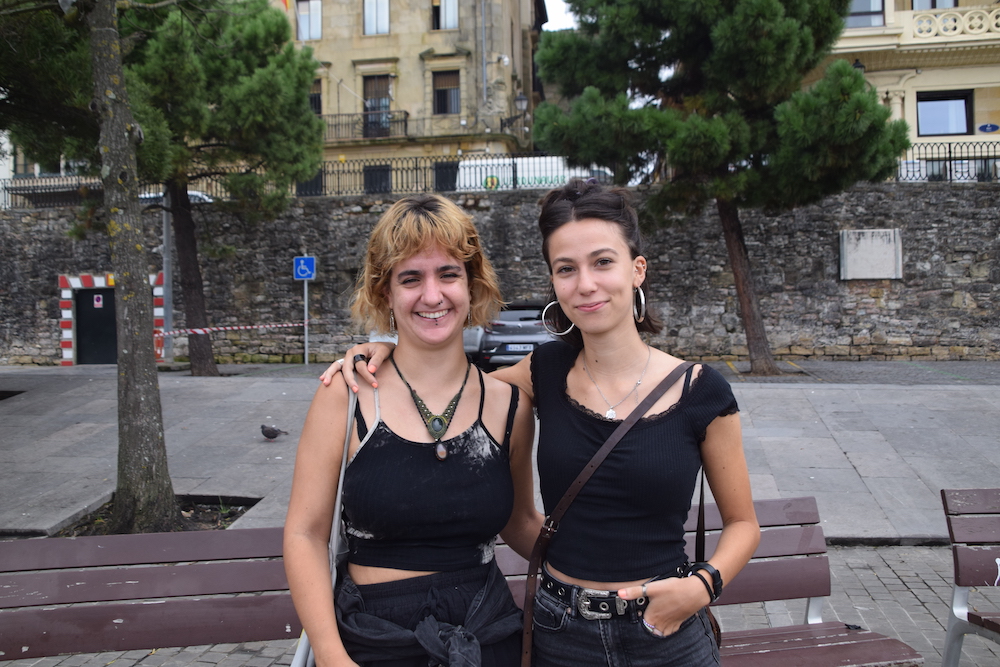
- The 133 members of the ERNAI youth organization have been fined for mobilizing against the imprisonment of Aitor Zelaia and Galder Barbado in the Barakaldo prison. In total it is EUR 290,500, and a levy has been put in place to enable the Basque people to make a contribution. Ibone Alonso and Aizpea Uranga, members of the organization, have encouraged young people to take the streets of the city in a demonstration that will depart from the Boulevard on September 8.

Let's put a little bit of context. Why did they imprison Zelaia and Barbado?
Ibone Alonso (I.A. ): For being young and militant and for participating in the processes of liberation of the Basque Country. This has been against Aitor and Galder, but they have done so to bend the entire Basque Country.
Aizpea Uranga (A.U. ): We see it as a step backwards, as if they had had a need to return to past times. We do not accept entry into prison, and to denounce it we have participated in several demonstrations. In this respect, we have been fined.
Why do you consider incarceration a step backwards?
I.A. : Euskal Herria now lives in other times, has taken another direction, and they want us to return to the old times. We believe this is not the time. This step forward has been seen, among other things, by the release of prisoners.
A total of 133 ERNAI members have been fined for their participation in the protests against the imprisonment of the young woman. There are a lot of people.
I.A. : We didn't expect it. The identification we did expect, but the application of a scathing law has left us very surprised. We waited for other processes. We are among the first to have this law applied to us, at least in the youth field. It was a blow to Christ.
All this has happened, therefore, since the ‘hasty law’ has been applied. What exactly is the “Haunted Law” and why has it been applied “in an abusive manner”?
I.A. : This law was enacted in 2015 and is a mechanism to stifle social workers. We have been the first, and if it applies to other actors, it is not sustainable for there to be youth movement.
A.U. : In view of this, we want to be a precedent; to us they have applied this law, but also in the mobilizations we want to put on the table the discourse against the Moorish law. We ask that it be debated, because it has now been applied to us, but, later on, so that no one else suffers. The fine is an amount of money that the organization cannot afford. In particular, the total amount of aid is estimated at EUR 290,500.
You have launched a campaign to get money. What does it consist of? What are the forecasts for the campaign?
I.A. : We have brought out the merchandising (t-shirts, hats and fans) and we have put in place a collection of funds so that the people can provide whatever they can. All contributions are welcome, albeit small. Many young people have seen that we have received a blow from Christ and, supposedly, join our demands.
A.U. : We don't know how long crowdfunding will be open, but we hope it goes well. Even if the contribution is minimal, for us it is an aid, and we encourage people to make that small contribution.
The mobilisation will take place on 8 September. It is a day marked in Donostia-San Sebastian, as it is the second Sunday of the Flag of La Concha. Why have you decided to do it that day?
A.U. : We have seen that the regatta are the meeting point of many young independentists, and we thought it was a good idea to mobilize that day and that our demands are also on the regatta.
I.A. : In addition, it seems to us a way to start the course vigorously. At the end of the course we announced that despite the difficulties we had, we were moving forward and we want to be showcase.
What are you going to report on that particular day?
A.U. : All of this has been a mechanism for frightening and crushing us, and we want to show that we're here and that we're getting more and more. Despite the fines, we are not afraid and we are going to move on.
Why do you think your project is “uncomfortable” for the Spanish Government?
I.A. : Because the young independentists have shown that there are other ways to build Euskal Herria, which work, and more and more young people are joining this struggle. We live in a capitalist cysheteropatriarchal neoliberal system that does not accept any other alternative. With the processes and alternatives that we have proposed, we have demonstrated that there are other ways to build Euskal Herria, and that is why we believe that we are an obstacle for them. After all, it has been seen that, both in politics and in society, independence attracts people and therefore sees us as a danger.